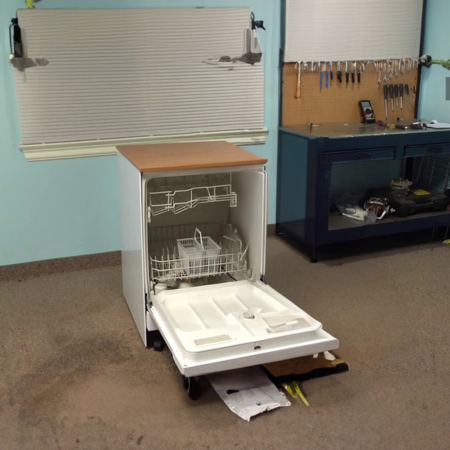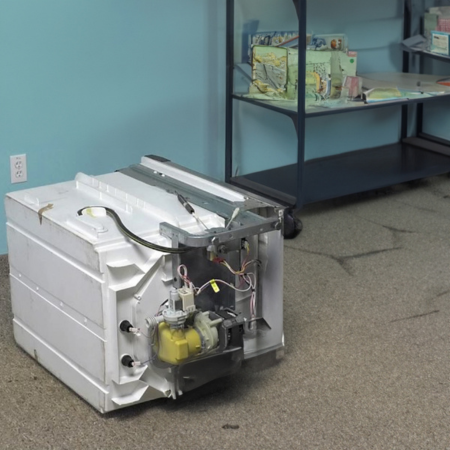It can be a significant inconvenience if the GE dishwasher not starting.
An unresponsive dishwasher can disrupt your daily routine, leaving you with a pile of unwashed dishes.
This could be due to many reasons ranging from electrical issues, and faulty components, to simple missteps in operation.
It’s crucial to identify the root cause to fix the problem effectively.
This guide will help you understand why your GE dishwasher may not be starting and provide possible solutions to rectify the issue.
Remember, even though some issues can be fixed with simple troubleshooting, it’s always best to consult a professional for complex dishwasher problems.
Key Points
- Power Supply: Ensure your GE dishwasher is correctly plugged in and your home’s electrical service is running. If the dishwasher still doesn’t start, the problem could be a blown fuse or tripped circuit breaker.
- Door Latch: For safety reasons, dishwashers are designed not to start if the door is not latched properly. Check if the door latch is working as it should, as a faulty latch might prevent the dishwasher from starting.
- Control Panel: If your dishwasher’s control panel is not responding, there could be a problem with the control panel or touchpad. These might need replacement or repair.
- Timer or Electronic Control: If the timer or electronic control is faulty, it could prevent the dishwasher from starting.
5 Reasons Why GE Dishwasher Not Starting
When your GE dishwasher refuses to start, it can be frustrating and disrupt your daily routine. Here are five possible reasons for this problem:
1. Faulty Door Latch
A faulty door latch can prevent your GE dishwasher from starting. The dishwasher won’t function if it can’t securely close.
The problem could be a mechanical issue with the latch. It could be stuck or broken.
Another possibility is an electrical issue. The dishwasher won’t start if the latch isn’t sending the correct signal.
You can inspect the latch visually for any clear signs of damage. Remember to unplug the dishwasher before starting any inspection.
You may need to replace the latch if you notice any obvious faults.
In case of wiring or electrical issues, it’s recommended to consult a professional. They can accurately diagnose and resolve the problem.
2. Broken Start Relay
The start relay plays a vital role in your dishwasher’s operation. It’s a component that helps the motor to run. If the start relay is broken, your GE dishwasher won’t start.
Signs of a faulty start relay include a dishwasher that does not start or gets unusually hot. It may also produce a clicking sound.

You can check the start relay by removing it from the dishwasher and testing it with a multimeter. If it shows no continuity, it’s faulty and needs replacement.
Remember to always unplug the dishwasher before starting any inspection.
Consult your dishwasher’s manual for specific instructions to replace the start relay.
If you’re uncertain or the replacement seems complex, engaging a professional is best. They’ll ensure a safe and correct replacement, helping your dishwasher to function as expected again.
3. Defective Timer
The timer in your GE dishwasher is crucial. It controls the length of each cycle. A defective timer means your dishwasher won’t start. Symptoms may include the dishwasher not advancing through the cycle or not completing a wash cycle.
Inspect the timer visually for signs of burning or a possible short circuit. For this, remember to unplug the dishwasher beforehand. If you find obvious damage, the timer needs replacing.
However, testing the timer’s functionality requires a multimeter. This checks for continuity. No continuity? Your timer is defective.
Replacing a dishwasher timer can be complex. It depends on your dishwasher model and its internal configuration. Always consult your dishwasher’s manual for detailed guidance.
If the process seems too intricate, hire a professional. They have the expertise to replace the timer safely and correctly. This way, your dishwasher will be back to its optimal working condition.
4. Malfunctioning Selector Switch
The selector switch on your GE dishwasher is another component that could prevent it from starting. This switch lets you choose different wash cycles and options.
Malfunctioning switches often cause problems. Symptoms could include your dishwasher not filling or draining, or not starting at all.
Visual inspection is the first step. Look for signs of burning or melting, indicating a faulty switch. Remember, safety first – always unplug your dishwasher before beginning.
Testing the selector switch for functionality requires a multimeter. This device checks for continuity. A lack of continuity means your selector switch is defective.
Replacing the selector switch can be a complex task. Your dishwasher’s manual will provide specific instructions.
However, if you’re unsure, consider hiring a professional. They can ensure safe and correct replacement. By doing this, you’ll have your dishwasher up and running in no time.
5. Electrical Wiring Issues
Electrical wiring issues in your GE dishwasher can prevent it from starting. These problems may stem from a faulty wire or a loose connection.
Look out for signs of wear and tear. This includes frayed wires or rusted connections. Safety is crucial. Always unplug your dishwasher before inspecting.

Using a multimeter is necessary to test the wires for continuity. A lack of continuity indicates a wiring problem.
Fixing electrical wiring issues involves replacing faulty wires or tightening loose connections. Refer to your dishwasher’s manual for specific guidance.
Electrical repairs can be dangerous if not done correctly. It’s advisable to hire a professional if you’re unsure. They have the skills to resolve the issue safely and efficiently. This ensures your dishwasher returns to peak performance swiftly.
How To Troubleshoot GE Dishwasher Not Starting?
Begin the troubleshooting process by:
- Checking the control panel. A broken or unresponsive control panel may prevent the dishwasher from starting.
- Inspecting the door latch. If the dishwasher door isn’t completely shut, the dishwasher won’t start.
- Testing the thermal fuse. A blown fuse can disrupt power to the dishwasher, preventing it from starting.
- Checking the timer motor. This component controls the duration of each cycle. If faulty, it can prevent the dishwasher from starting.
Remember:
- Always unplug your dishwasher before starting to troubleshoot.
- Use a multimeter for electrical tests.
- If you’re unsure or uncomfortable doing these checks, hire a professional. They can diagnose and fix the problem efficiently.
- Your dishwasher’s user manual often provides valuable troubleshooting guidelines.
By following these steps, you can identify and fix the issue preventing your GE dishwasher from starting.
Signs You Should Call A Professional
When dealing with GE Dishwasher issues, it’s crucial to know when professional help is necessary. Recognizing these signs can save you from further complications and costs.
- Persistent leaks: If you’ve noticed recurring puddles around your dishwasher, a professional should inspect it.
- Strange sounds: Unusual noises during operation can indicate a serious issue needing expert attention.
- Ineffectual cleaning: If your dishwasher consistently leaves dishes dirty, it might have a hard-to-diagnose problem.
- Frequent cycles: Dishwashers should not need to run multiple cycles to clean dishes.
- Failed starts: If your dishwasher consistently refuses to start, it may have an electrical issue a professional should handle.
- Persistent odors: Long-lasting smells suggest drainage problems or trapped food debris.
- Error codes: Many newer models display error codes when experiencing problems. These codes can be hard for homeowners to interpret.
- Electric shocks: If touching your dishwasher results in a mild electric shock, immediately call a professional.
- Age of the dishwasher: Dishwashers over ten years old can often benefit from a professional examination. They might require replacement parts or even a full replacement.
Remember, calling a professional can sometimes seem costly, but it can often save money in the long term by preventing further issues.
Conclusion
Wrapping up, it’s vital to recognize when your dishwasher needs a pro’s touch. Persistent issues like leaks, odd sounds, and inefficient cleaning are clear indicators.
Don’t ignore constant odors or frequent cycles. These could point to deeper issues. Struggling with error codes or electric shocks?
Call an expert immediately. Remember, even aging dishwashers can benefit from an expert’s view. Yes, professional assistance might seem pricey.
But, it often saves you more in the long run. Be smart, don’t let small issues escalate into larger, costlier ones.
- Can You Scrap A Microwave And Why You Should? - May 13, 2024
- Can You Put Metal In A Convection Microwave: 10 Major Risks - May 12, 2024
- Can You Use A Microwave Without The Glass: 10 Benefits - May 11, 2024

